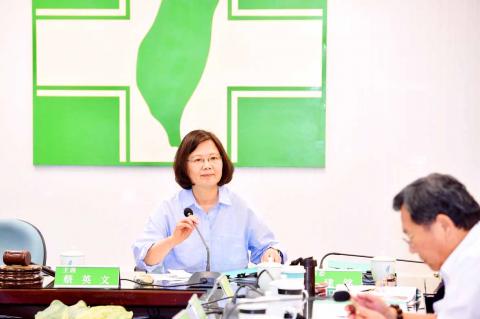President Tsai Ing-wen (蔡英文) yesterday said that China’s persecution of Taiwan is a calculated move to meddle in the nation’s domestic politics and influence upcoming local elections.
Tsai, who is also chairperson of the Democratic Progressive Party (DPP), made the remarks at a meeting of the party’s Central Executive Committee, citing incidents over the past few months such as El Salvador breaking diplomatic ties, the cancelation of Taichung’s right to host the first East Asian Youth Games next year and Beijing’s pressure campaigns against Taiwanese coffee and bakery chain 85°C (85度C) and international airlines.
“We must steel ourselves against the reality that China’s persecution of Taiwan will continue unabated into the election season,” Tsai said.

Photo: Peter Lo, Taipei Times
“China’s goals in persecuting Taiwan are to strike at our morale and to influence the nation’s domestic politics and election results,” she added.
As Taiwanese have chosen sovereignty and democracy, the government would confront the challenges before it with courage, Tsai said.
The cross-strait relationship is a part of geopolitics and China’s persecution of Taiwan is driven by its quest for regional influence, not internal political differences in Taiwanese political parties about China, she said.
The demands China has made on the nation’s sovereignty has crossed the line for all major Taiwanese political parties and the common denominator of Taiwanese society is that the nation of Taiwan is the Republic of China, she added.
“We must hold this line; we are the ruling party and we are duty-bound,” the president said.
China has intensified its campaign to persecute the nation because Taiwan has strengthened its relationship with major powers on issues of substance and because the DPP administration has refused to make any compromise on national sovereignty, she said.
“I return to my quotation of [former US] president [Ronald] Reagan: ‘Everything is negotiable except two things, our freedom and our future,’” Tsai said.
“We must have the conviction that the harder the test, the more we must keep our faith that we are on the right path,” she said, urging the DPP to support her administration’s efforts to strengthen the nation’s economy and defenses.
“The behavior of our neighbor across the [Taiwan] Strait is out of our hands, but so long as the nation stands together for democratic values and institutions, we control our own destiny,” she added.
Additional reporting by CNA

The Ministry of the Interior (MOI) is to tighten rules for candidates running for public office, requiring them to declare that they do not hold a Chinese household registration or passport, and that they possess no other foreign citizenship. The requirement was set out in a draft amendment to the Enforcement Rules of the Public Officials Election and Recall Act (公職人員選舉罷免法 ) released by the ministry on Thursday. Under the proposal, candidates would need to make the declaration when submitting their registration forms, which would be published in the official election bulletin. The move follows the removal of several elected officials who were

The Republic of China (ROC) is celebrating its 114th Double Ten National Day today, featuring military parades and a variety of performances and speeches in front of the Presidential Office in Taipei. The Taiwan Taiko Association opened the celebrations with a 100-drummer performance, including young percussionists. As per tradition, an air force Mirage 2000 fighter jet flew over the Presidential Office as a part of the performance. The Honor Guards of the ROC and its marching band also heralded in a military parade. Students from Taichung's Shin Min High School then followed with a colorful performance using floral imagery to represent Taiwan's alternate name

FOUR DESIGNATED AREAS: Notices were issued for live-fire exercises in waters south and northwest of Penghu, northeast of Keelung and west of Kaohsiung, they said The military is planning three major annual exercises across the army, navy and air force this month, with the navy’s “Hai Chiang” (海強, “Sea Strong”) drills running from today through Thursday, the Ministry of National Defense said yesterday. The Hai Chiang exercise, which is to take place in waters surrounding Taiwan, would feature P-3C Orion maritime patrol aircraft and S-70C anti-submarine helicopters, the ministry said, adding that the drills aim to bolster the nation’s offshore defensive capabilities. China has intensified military and psychological pressure against Taiwan, repeatedly sending warplanes and vessels into areas near the nation’s air defense identification zone and across

A Chinese takeover of Taiwan would severely threaten the national security of the US, Japan, the Philippines and other nations, while global economic losses could reach US$10 trillion, National Security Council Deputy Secretary-General Lin Fei-fan (林飛帆) wrote in an article published yesterday in Foreign Affairs. “The future of Taiwan is not merely a regional concern; it is a test of whether the international order can withstand the pressure of authoritarian expansionism,” Lin wrote in the article titled “Taiwan’s Plan for Peace Through Strength — How Investments in Resilience Can Deter Beijing.” Chinese President Xi Jinping’s (習近平) intent to take Taiwan by force